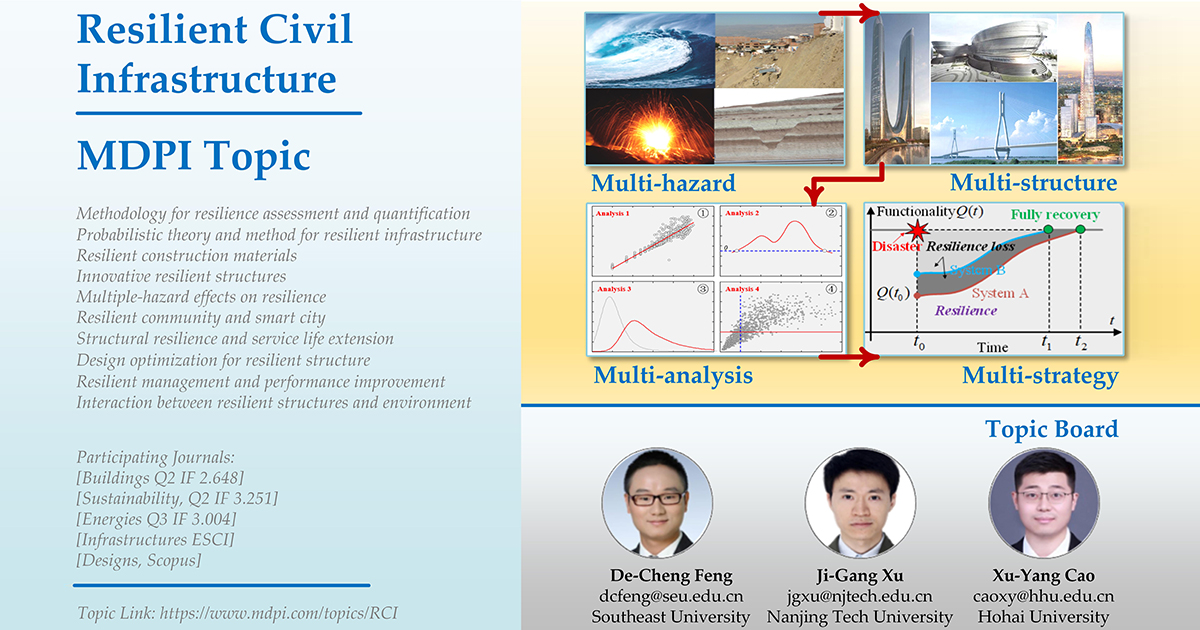Topic Menu
► Topic MenuTopic Editors



Resilient Civil Infrastructure

Topic Information
Dear Colleagues,
Due to their vital role in modern communities and cities, civil infrastructures should be able to resist and recover from natural or human-made disasters, such as earthquakes, hurricanes, floods, tsunamis, fires, blasts, etc. Developing resilient civil infrastructure has garnered significant research attention over the last decade. Although significant advances have been made in this field in recent years, there are still important challenges related to the more effective resilience quantification and resilience enhancement of civil infrastructures to multiple disasters, ranging from the theory aspect (e.g., mechanical principle, interaction effect), to the technology aspect (e.g., material property, system innovation) and the decision aspect (e.g., assessment strategy, decision making). These challenges require further, more comprehensive efforts and more general intervention planning. From the above perspective, this topic aims to improve knowledge and performance in resilient civil infrastructure through enhanced scientific and multi-disciplinary works. The potential topics include (but are not limited to):
- Methodology for resilience assessment and quantification;
- Probabilistic theory and method for resilient infrastructure;
- Resilient construction materials;
- Innovative resilient structures;
- Multiple-hazard effects on resilience;
- Resilient community and smart city;
- Structural resilience and service life extension;
- Design optimization for resilient structure;
- Resilient management and performance improvement;
- Interaction between resilient structures and environment.
Dr. De-Cheng Feng
Dr. Ji-Gang Xu
Dr. Xuyang Cao
Topic Editors
Keywords
- life-cycle hazard resilience
- resilience assessment and enhancement
- resilience under multiple hazards
- innovative resilient structures
- high-performance materials for resilience
- resilient community and city
- service life resilience evaluation
- resilient design optimization
- resilient probabilistic theory
- resilient assessment approach
- resilient management strategy
- resilient interaction
Participating Journals
| Journal Name | Impact Factor | CiteScore | Launched Year | First Decision (median) | APC |
|---|---|---|---|---|---|

Buildings
|
3.1 | 4.4 | 2011 | 15.1 Days | CHF 2600 |

Designs
|
- | 4.8 | 2017 | 18.5 Days | CHF 1600 |

Energies
|
3.2 | 7.3 | 2008 | 16.8 Days | CHF 2600 |

Infrastructures
|
2.9 | 6.0 | 2016 | 18.3 Days | CHF 1800 |

Sustainability
|
3.3 | 7.7 | 2009 | 17.9 Days | CHF 2400 |

Preprints.org is a multidisciplinary platform offering a preprint service designed to facilitate the early sharing of your research. It supports and empowers your research journey from the very beginning.
MDPI Topics is collaborating with Preprints.org and has established a direct connection between MDPI journals and the platform. Authors are encouraged to take advantage of this opportunity by posting their preprints at Preprints.org prior to publication:
- Share your research immediately: disseminate your ideas prior to publication and establish priority for your work.
- Safeguard your intellectual contribution: Protect your ideas with a time-stamped preprint that serves as proof of your research timeline.
- Boost visibility and impact: Increase the reach and influence of your research by making it accessible to a global audience.
- Gain early feedback: Receive valuable input and insights from peers before submitting to a journal.
- Ensure broad indexing: Web of Science (Preprint Citation Index), Google Scholar, Crossref, SHARE, PrePubMed, Scilit and Europe PMC.
Related Topic
- Resilient Civil Infrastructure, 2nd Edition (24 articles)

